Bacon sandwiches at dawn: how Sunak won over rebels and kept his government afloat
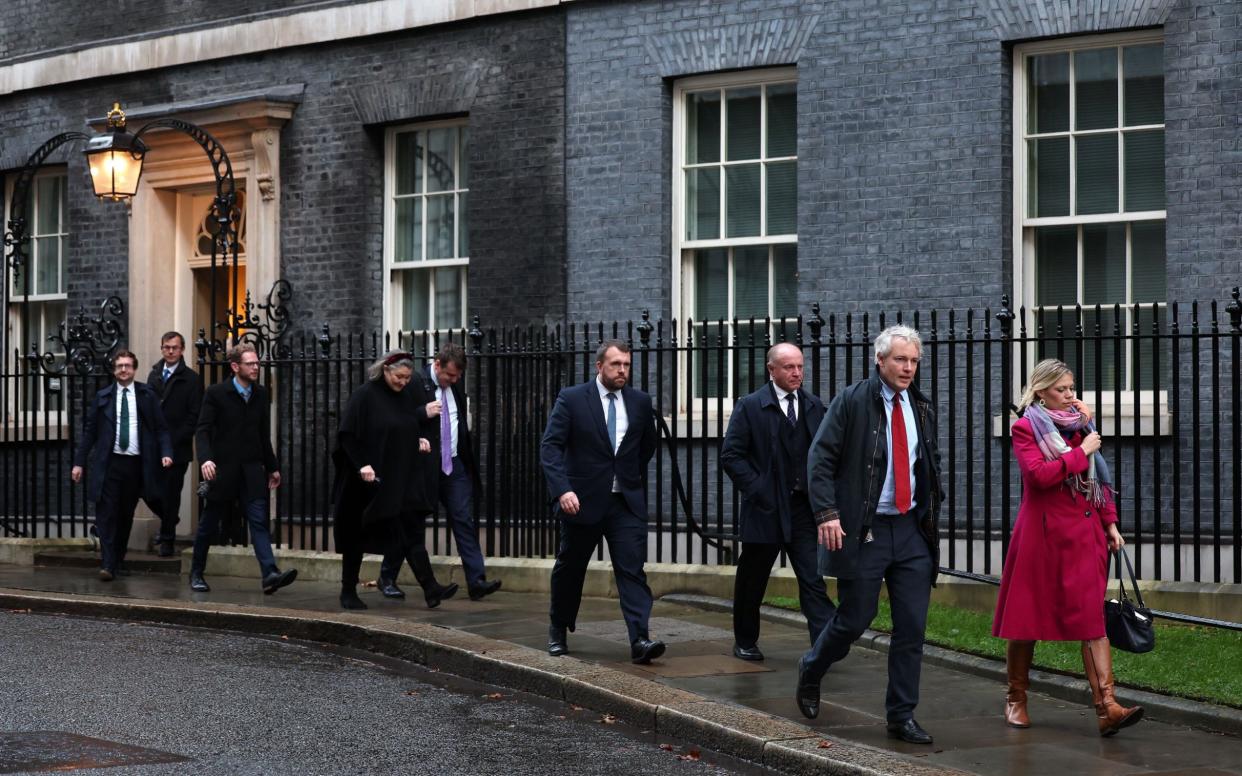
With storm clouds gathering menacingly in Westminster – both literally and figuratively – the Prime Minister called potential rebels into Downing Street for a make-or-break breakfast meeting.
If Rishi Sunak could persuade Right-wing Tory backbenchers to support his Rwanda Bill, or at least not to vote against it, his struggling government would be able to limp on into an election at the time of his choosing later next year.
If he couldn’t, it could mean the end of his time in office, and an election that could usher in years of Labour rule.
At around 7.30am, 15 members of the New Conservatives group, which included Danny Kruger, Miriam Cates, Jonathan Gullis, Marco Longhi and Nick Fletcher, trooped up Downing Street for the crucial meeting.
Inside No 10, they were given bacon sandwiches while the Prime Minister urged them to back the Bill.
Also in the room were deputy chiefs of staff Will Tanner and Rupert Yorke; and Craig Williams, Mr Sunak’s parliamentary private secretary.
Mr Kruger told the Prime Minister he had only three options: to pull the Bill now, to commit to making amendments, or refuse to make any changes. If he chose the latter course, he told him, people would vote against.
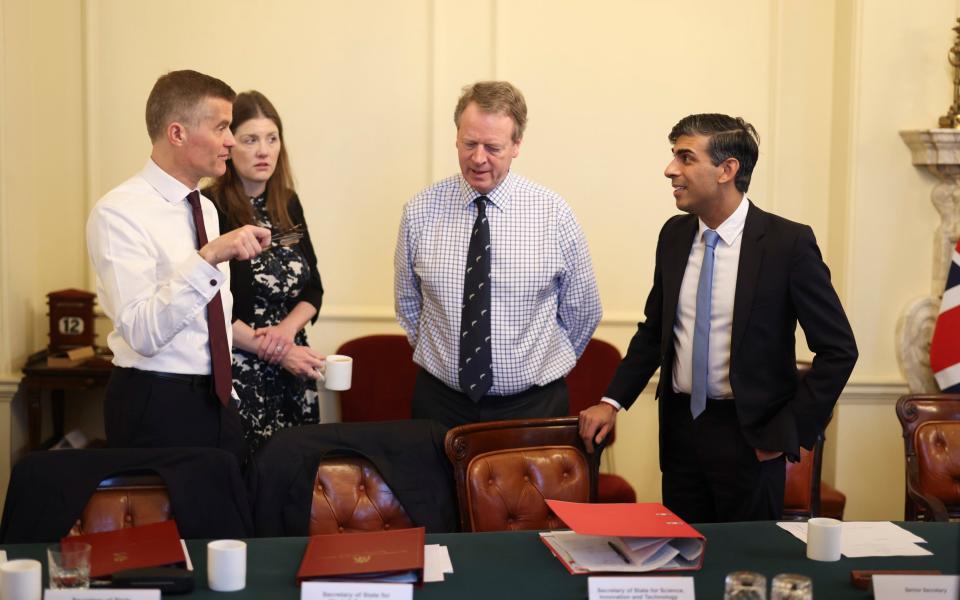
The Prime Minister’s reply was to tell him that while he would not pull the Bill, he would consider suggestions to tighten it up.
It was exactly the type of language designed to persuade some of the rebels to pull back from the brink.
But then Mr Sunak made the task harder. He angered some of the rebels by complaining that he had inherited the small boats issue and high levels of immigration, and blaming his predecessors for doing too little about it.
One source said Mr Sunak “half raised” the idea of amendments but only within the framework of the Bill. However, they added that he then set out how the Bill was actually very good and didn’t see the need for them. “It was a frosty reception,” they said.
‘Didn’t go that well’
As one Tory source said, the meeting “didn’t go that well”. “Rishi was pointing the finger at Boris [Johnson], Liz [Truss], Suella [Braverman] and Rob [Jenrick],” the source said.
Other MPs spoke up at the meeting to say they felt they had not been properly consulted either before the Bill was published, or afterwards.
When Nick Fletcher told Mr Sunak his government needed to be more Tory, the Prime Minister replied that he was a Tory and highlighted the tax cuts in the Autumn Statement.
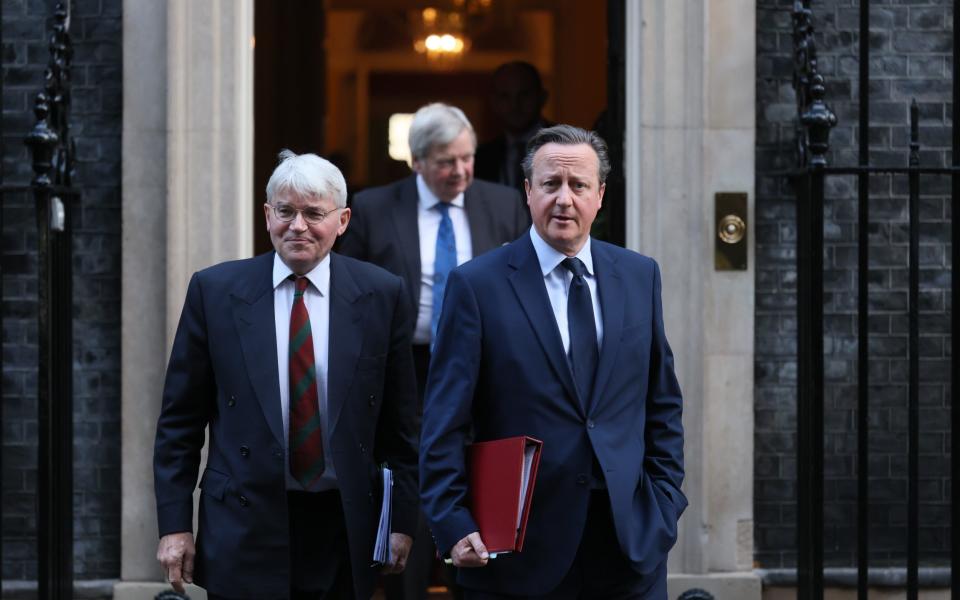
As the MPs filed out from their meeting, No 10 was optimistic.
“It was a very useful meeting to hear MPs’ thoughts and discuss their concerns,” a source said. “The Bill has been drafted with close attention to detail, with colleagues’ input helping to shape the legislation.
“The tests set for the Bill have been met and we will continue to listen to and engage with colleagues across the party as it passes through Parliament. This Bill will work and will do what we need it to do.”
But one source close to the Tory rebels said: “Rishi was pretty dismissive. He didn’t seem to want to open up a serious alternative path [for the Bill]. It was a little bit stroppy teenager mode.”
Anger at Sunak
There were suggestions that anger at Mr Sunak was wider than just the Rwanda issue, with those on the Right feeling increasingly ignored since the sacking of Suella Braverman as home secretary, their flag bearer in the Cabinet.
This, and the appointment of the moderate Lord Cameron as Foreign Secretary, made some feel the Government was moving further to the centre.
Soon after the No 10 meeting, key figures from all five Right-wing groups threatening to vote down the Bill met Chief Whip Simon Hart in his office.
But a source played down hopes that it had led to much of a change of heart, saying: “They didn’t feel there was much progress made or that more ground was given by the Government.”
Nevertheless, at lunchtime, Mr Sunak looked chipper as he was seen in public for the first time, sitting on the front bench next to James Cleverly.
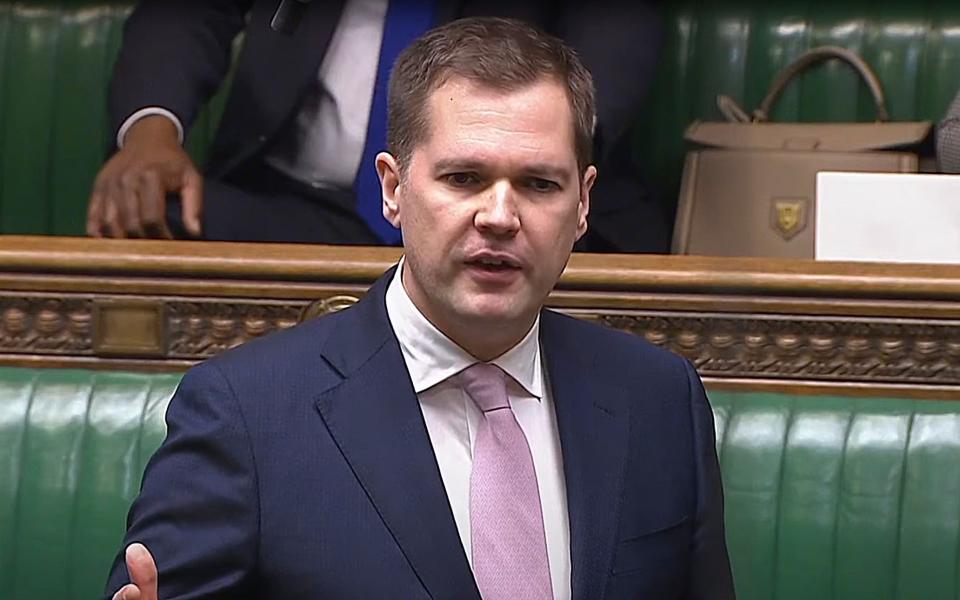
The Home Secretary was opening for the Government in the debate on the second reading of the Rwanda Bill.
A source close to Mr Cleverly insisted ministers were listening and would continue to listen to rebel MPs demands for changes to the Bill – but it was a “pretty tight landing strip” if there were to be any more changes.
The source said the Government’s argument was: “No one is going to prove their concerns about whether something can work by ensuring it cannot work.”
‘Edge of the envelope’
Mr Cleverly himself told MPs: “The actions that we are taking, whilst novel, whilst very much pushing at the edge of the envelope, are within the framework of international law.”
During the debate, rebel backbenchers were critical, but none came out to say they would go further than abstaining on the Bill by actually voting against.
Mr Kruger told the Commons: “I regret we have got an unsatisfactory Bill. I can’t undertake to support it tonight.”
Robert Jenrick, the former immigration minister who shocked Westminster by resigning last week, said he wanted the Rwanda Bill to work and suggested he would back it as long as sufficiently strong amendments were laid.
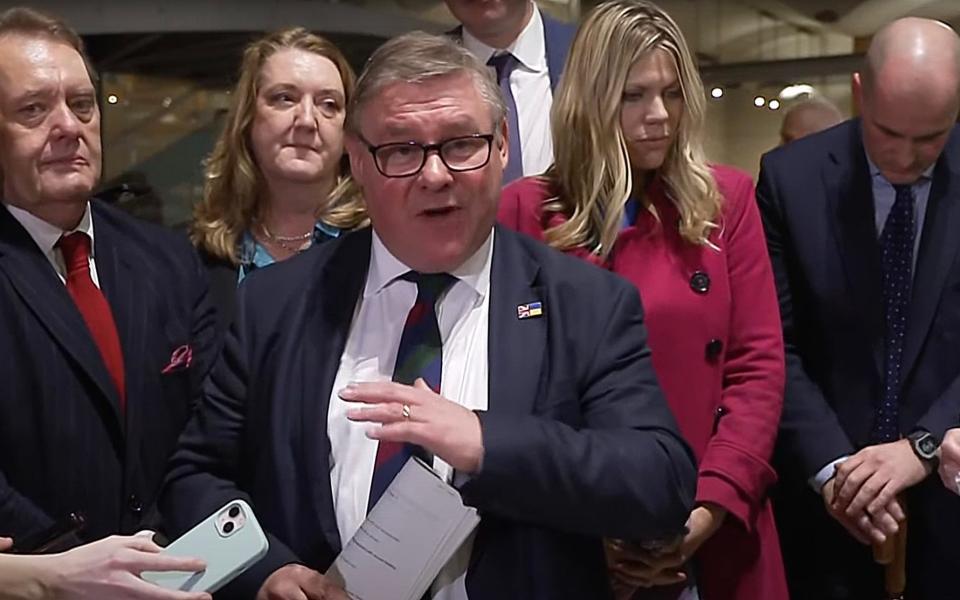
He warned that small boat arrivals to the UK would “rise for many years to come” if the Government failed to successfully roll out its Rwanda migrant flights policy.
But, on the other side of the argument, Bob Neill, the former minister, warned: “The day a Conservative Party thinks the ends justify the means, that any single policy objective overrides the checks and balances of our constitution, it has ceased to be a Conservative Party.”
Mr Sunak may have appeared optimistic in public, but Tory whips were not taking anything for granted.
Overnight, members of the international development select committee were told to pull a trip to the Caribbean in order to make the vote.
Dragged back
Sir Graham Stuart, the environment minister, was dragged back from the Middle East where the Cop climate summit is still going on, leaving no ministerial presence for the final hours of talks.
So close was the vote that even Peter Bone – currently suspended from the Conservative Party for exposing himself to an aide – came to Parliament to have his say.
As did former attorney general Sir Geoffrey Cox, who spends much of his time out of Parliament doing legal work.
In a dramatic speech, he said it was vital to retain the right of individuals to access a court in the Bill – something the rebels want to see removed, adding: “On the preservation of the right to go to court in an extreme case, I say that is part of the British constitution that our fathers and our party has supported, and fought for for generations, and it’d be wrong for us to compromise on it.”
A row broke out about whether Tory whips warned rebels they could be kicked out of the parliamentary party if they did not vote for the Rwanda Bill.
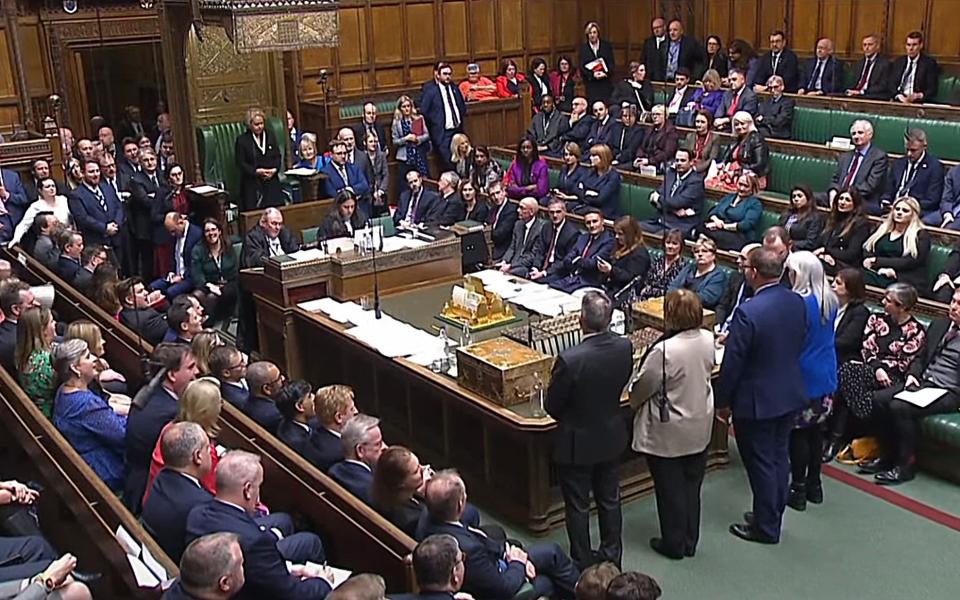
Sir Bill Cash, the veteran Conservative MP who headed up the Tory Right’s so-called “star chamber”, confronted Mr Hart, the chief whip, with the allegations. Mr Hart disputed the claims. “The chief made very clear to Cash that no one had been threatened,” a Tory source said.
Mr Sunak spent much of the afternoon in his parliamentary office personally trying to convince Tory rebels not to vote against.
He also met members of the One Nation caucus of moderate Tory MPs to calm their fears that any further concessions to the Right would go too far.
‘It breaks all the rules’
A former Cabinet minister from the grouping said: “It cannot go any further. Any further and it breaks all the rules. There will be push back from the other direction, from my side, if he is seen to lean too heavily to the Right.”
At 5.15pm, the “five families” – the five groups threatening to rebel (the European Research Group, the New Conservatives, the Northern Research Group, the Common Sense Group, and the Conservative Growth Group) – met for the final time to decide how to vote.
Ninety minutes later they emerged, and at an impromptu press conference revealed that, after all the drama of the day, they had decided merely to abstain.
Leading rebel Sir Mark Francois told the waiting media: “We have decided collectively that we cannot support the Bill tonight because of its many omissions.
“The Prime Minister has been telling colleagues today he is prepared to entertain tightening the Bill.
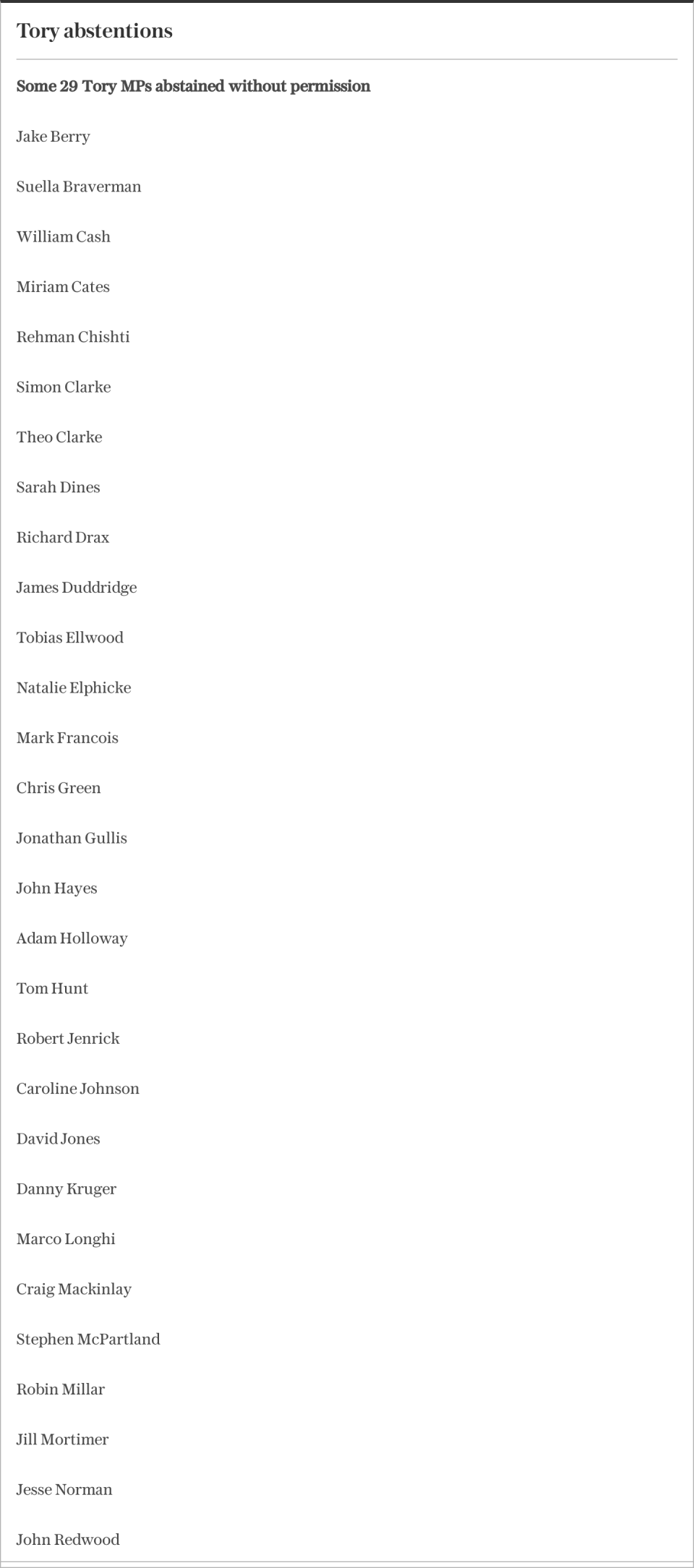
“With that aim, at the committee stage, we will aim to table amendments which would – we hope, if accepted – materially improve the Bill and remove some of its weaknesses.”
Sir John Hayes, chairman of the Common Sense Group of Tory MPs, said the decision to withhold support and abstain was a “chance for the Government to listen”.
He said: “We believe that that engagement provides the opportunity to make this Bill into what it says on the tin, which is to provide the opportunity to effect the Rwanda policy and so fulfil the Prime Minister’s pledge to stop boats.
“We will consider what the Government does next. What they do next will determine what we do next. That means that we wait until the third reading.”
It was tough talk from the rebels, raising the prospect that Mr Sunak had merely pushed defeat back into the new year if he refuses to bow to the Right-wing’s demands.
Once the result of the vote was announced at 7.30pm on Tuesday night as a clear victory for the Government, the Prime Minister embraced the Chief Whip.
He could be forgiven for breathing a sigh of relief.


